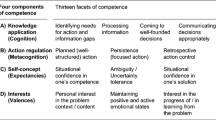Abstract
Economic analysis of asymmetric information typically starts with the assumption that individuals know more about their own characteristics than outside observers. This assumption implies that individuals can accurately assess their own competence in a given domain. However, individuals can only judge their competence if they are sufficiently competent. Results from field experiments contradict predictions from economic theories that assume self-aware agents, but are consistent with predictions from theories that incorporate a positive correlation between competence and self-awareness in a given domain. This correlation explains some of the overconfidence observed among economic agents and implies a structure on decision errors that can be exploited to make novel predictions in important areas of economics.
Similar content being viewed by others
Explore related subjects
Discover the latest articles and news from researchers in related subjects, suggested using machine learning.Notes
Based on results in the psychology literature, Barber & Odean assume males are more overconfident than females. Their analysis did not actually measure overconfidence nor control for competence.
Depending on the exam, 8%–13% of the subjects in Class 1 received the $25 payoff. Depending on the exam, 30–50% of the subjects in the Classes 2 and 3 received a payoff.
For each class, the average performance of the subjects who took each of three exams is not significantly different from that of subjects who took only one or two of the exams.
Kruger and Dunning tested competence in grammar, logic and humor in the laboratory.
Inferences from hypothesis testing in Table 1 are the same if nonparametric Wilcoxon signed-rank tests are used.
All regressions were performed in Stata v.8. A Breusch-Pagan test for random effects returned significant results (p < 0.001) on all models. For all regressions, a Hausman specification test failed to reject the null hypothesis that the random effects and the regressors are uncorrelated (p > 0.15), suggesting the random effects model is appropriate.
I thank an anonymous referee for suggesting this rival explanation.
As with Experiment 1, IRB human subjects approval for establishing this market was obtained.
After three economics professors observed these contracts, each predicted that Contract A would be the most popular and that the class professor would have to award many points in payouts.
References
Barber, B. M., & Odean, T. (2001). Boys will be boys: gender, overconfidence, and common stock investment. Quarterly Journal of Economics, 116(1), 261–292.
Bernardo, A., & Welch, I. (2001). On the evolution of overconfidence and entrepreneurs. Journal of Economics and Management Strategy, 10(3), 301–330.
Camerer, C., & Lovallo, D. (1999). Overconfidence and excess entry: an experimental approach. American Economic Review, 89(1), 306–318.
Cawley, J., & Philipson, T. (1999). An empirical examination of information barriers to trade in insurance. American Economic Review, 89(4), 827–846.
Daniel, K. D., Hirshleifer, D., & Subrahmanyam, A. (1998). Investor psychology and security market under- and over-reactions. Journal of Finance, 53(5), 1839–1886.
Gervais, S., & Odean, T. (2001). Learning to be overconfident. Review of Financial Studies, 14(1), 1–27.
Golec, J. H., & Tamarkin, M. (1995). Do bettors prefer longshots because they are risk-lovers or are they just overconfident? Journal of Risk and Uncertainty, 11, 51–64.
Harrison, G., & List, J. (2004). Field experiments. Journal of Economic Literature, 42(4), 1009–1055.
Hvide, H. K. (2002). Pragmatic beliefs and overconfidence. Journal of Economic Behavior and Organization, 48, 15–28.
Krueger, J. I., & Mueller, R. A. (2002). Unskilled, unaware, or both? The contribution of social perceptual skills and statistical regression to self-enhancement biases. Journal of Personality and Social Psychology, 82(2), 180–188.
Kruger, J., & Dunning, D. (1999). Unskilled and unaware of it: how difficulties in recognizing one’s own incompetence lead to inflated self-assessments. Journal of Personality and Social Psychology, 77(6), 1121–1134.
Kruger, J., & Dunning, D. (2002). Unskilled and unaware—But why? A reply to Krueger and Mueller. Journal of Personality and Social Psychology, 82(2), 189–192.
Kyle, A. S., & Wang, F. A. (1997). Speculation Duopoly with agreement to disagree: can overconfidence survive the market test? Journal of Finance, 52(5), 2073–2090.
Odean, T. (1999). Do investors trade too much? American Economic Review, 89, 1279–1298.
Rothschild, M. D., & Stiglitz, J. E. (1976). Equilibrium in Competitive Insurance Markets: an essay in the economics of imperfect information. Quarterly Journal of Economics, 90(4), 629–649.
Svenson, O. (1981). Are we all less risky and more skillful than our fellow drivers? Acta Psychologica, 47, 143–146.
Author information
Authors and Affiliations
Corresponding author
Additional information
The author thanks Monica Capra, Marco Castillo, Ron Cummings, Dorla Evans, Ragan Petrie, and Laura Taylor for helpful comments on this manuscript. Thanks also to Susan Laury and Shelby Frost for access to their classes. Special thanks to Yongsheng Xu for helpful conversations about games with unaware agents.
Electronic Supplementary Material
Below is the link to the electronic supplementary material.
ESM 1
(DOC 53 kb)
Rights and permissions
About this article
Cite this article
Ferraro, P.J. Know Thyself: Competence and Self-awareness. Atl Econ J 38, 183–196 (2010). https://doi.org/10.1007/s11293-010-9226-2
Published:
Issue Date:
DOI: https://doi.org/10.1007/s11293-010-9226-2




